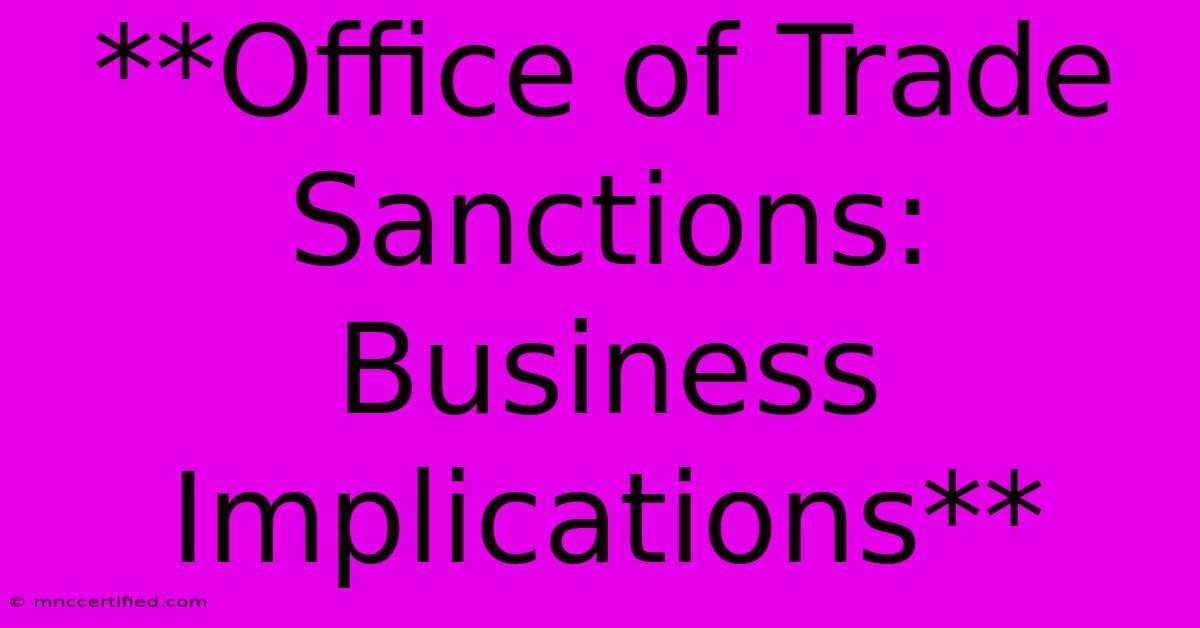**Office Of Trade Sanctions: Business Implications**

Table of Contents
Office of Foreign Assets Control (OFAC): Business Implications
The Office of Foreign Assets Control (OFAC), a division within the U.S. Department of the Treasury, is responsible for administering and enforcing economic and trade sanctions based on U.S. foreign policy and national security goals. These sanctions can significantly impact businesses operating domestically and internationally, making it crucial for companies to understand the implications and comply with OFAC regulations.
What are OFAC Sanctions?
OFAC sanctions are restrictions imposed by the U.S. government on specific individuals, entities, or countries. These sanctions can take various forms, including:
- Asset freezes: Blocking assets held by designated individuals or entities within the U.S. financial system.
- Trade restrictions: Prohibiting or limiting trade with designated countries or entities.
- Investment restrictions: Preventing U.S. companies or individuals from investing in designated countries or entities.
- Travel restrictions: Restricting travel to or from designated countries or entities.
Business Implications of OFAC Sanctions
Businesses of all sizes can face significant consequences for non-compliance with OFAC regulations, including:
- Civil and criminal penalties: Violators can face substantial fines, imprisonment, and other penalties.
- Reputational damage: Non-compliance can damage a company's reputation and erode customer trust.
- Business disruption: Sanctions can disrupt business operations, including financial transactions, trade activities, and supply chains.
- Loss of licenses and permits: OFAC violations can lead to the revocation of licenses and permits required to operate.
Key Areas of Compliance
Businesses need to be aware of and adhere to key OFAC regulations, including:
- Know Your Customer (KYC) and Due Diligence: Companies must conduct rigorous KYC checks on customers and partners to identify potential risks associated with OFAC sanctions.
- Sanctions Screening: Businesses should regularly screen transactions, customers, and suppliers against OFAC's Specially Designated Nationals (SDN) list and other sanctions programs.
- Export Controls: Companies exporting goods or services must comply with OFAC regulations related to exports to sanctioned countries or entities.
- Trade Financing: Businesses involved in trade financing need to ensure that their activities comply with OFAC regulations.
- Foreign Investment: Companies considering foreign investments must carefully assess the potential implications of OFAC sanctions.
Managing OFAC Compliance
Implementing a comprehensive OFAC compliance program is essential:
- Develop a written policy: Outline the company's commitment to OFAC compliance and establish clear procedures for screening and reporting.
- Train employees: Ensure that all relevant employees understand OFAC regulations and their responsibilities.
- Implement screening tools: Use software and databases to automatically screen transactions, customers, and suppliers against OFAC lists.
- Establish reporting mechanisms: Implement procedures for reporting suspected OFAC violations and collaborating with OFAC in case of an investigation.
Conclusion
Compliance with OFAC regulations is crucial for businesses operating in a globalized economy. Understanding the implications of sanctions, implementing effective compliance programs, and staying updated on changes to regulations are critical steps to minimize risk and ensure long-term success.
Keywords: OFAC, Office of Foreign Assets Control, sanctions, compliance, business implications, KYC, due diligence, sanctions screening, export controls, trade financing, foreign investment, penalties, reputation, disruption, licenses, permits.

Thank you for visiting our website wich cover about **Office Of Trade Sanctions: Business Implications**. We hope the information provided has been useful to you. Feel free to contact us if you have any questions or need further assistance. See you next time and dont miss to bookmark.
Featured Posts
-
How To Sue Insurance Company For Bad Faith
Nov 07, 2024
-
Champions League Brugge Inter Secure Wins
Nov 07, 2024
-
Doj Weighs Winding Down Trump Cases
Nov 07, 2024
-
Washington Lieutenant Governor Election 2024 Real Time Results
Nov 07, 2024
-
Trump Victory Impact On Bitcoins Future Price
Nov 07, 2024